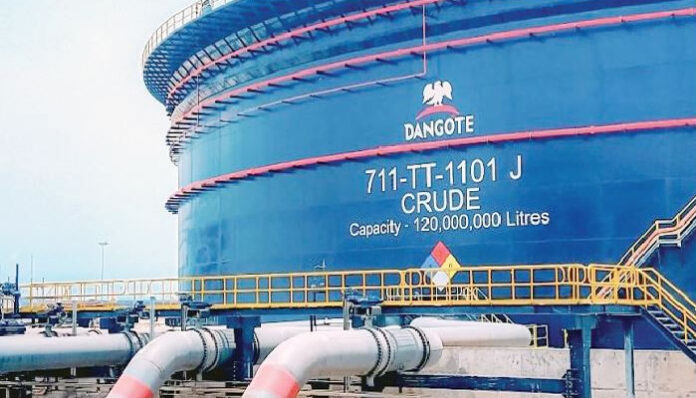The Vice President of Dangote Group, Mr. Devakumar Edwin, has revealed that the Dangote Petroleum Refinery has suffered 22 separate acts of sabotage since it began operations, prompting the company to carry out a major internal restructuring.
Edwin made this known during a visit to the refinery by King Bubaraye Dakolo, the Chairman of the Bayelsa State Traditional Rulers Council and King of Ekpetiama Kingdom. The tour came amid recent controversy surrounding the dismissal of workers and tensions with the Petroleum and Natural Gas Senior Staff Association of Nigeria (PENGASSAN).
Earlier, the refinery had announced that it dismissed only a small number of employees as part of its internal reorganisation. However, PENGASSAN claimed over 800 workers were sacked, allegedly due to a dispute between the union and the refinery’s management.
This claim led PENGASSAN to declare a nationwide strike on September 28, which was later suspended on October 1 after intervention from the federal government. Dangote Group eventually agreed to redeploy the affected workers to other subsidiaries within the group.
However, Edwin has now clarified that the restructuring had nothing to do with PENGASSAN or union activities. Instead, he said it was driven by security concerns and repeated attempts to sabotage the facility.
“We have been under repeated attacks,” Edwin said. “We have had 22 incidents of sabotage. These are not mere claims; we have the dates, the exact units targeted, and complete documentation from our master control room.”
He added that when the refinery project first began, critics had doubted it would ever be completed, let alone start operations. According to him, when the refinery overcame those hurdles, some individuals resorted to sabotage.
The Dangote Refinery, located in Lekki Free Zone, Lagos, is Africa’s largest refinery and one of the world’s most advanced. With a production capacity of 650,000 barrels per day, the facility is seen as a game-changer for Nigeria’s oil sector, expected to significantly reduce the country’s reliance on imported fuel.
Edwin said the attacks on the facility were deliberate, with individuals attempting to set fires or damage sensitive equipment by tampering with valves and instruments.
“Someone would open a valve to try to cause a breakdown. Others tried to start fires. But because of the ultra-modern systems we have, including automatic fire protection and fail-safe instruments, these attempts were quickly detected and neutralised,” he said.
He praised the design of the refinery’s systems, which automatically override unsafe actions, preventing damage to critical infrastructure.
“Even when someone tries to manipulate a machine or force a fault, the system overrides and stops it,” he explained. “We are grateful to God and to the technology in place that these acts of sabotage were not successful.”
Edwin stressed that the reorganisation of staff was a preventive step to protect the refinery and its multi-billion-dollar investment. He explained that the management had reviewed internal threats and took decisive action to avoid what could have been catastrophic losses.
“We were deeply concerned. One person could bring the entire system down. That is why we acted. And I repeat, this has nothing to do with PENGASSAN,” he stated.
He also refuted media reports that suggested the refinery was targeting unionised staff. According to him, the company met with government officials and security agencies in Abuja, where it was clearly explained that the issue was not related to any labour union conflict.
The Dangote Refinery began limited production earlier this year and is expected to become fully operational soon. The refinery’s launch is a major step for Nigeria, which has struggled for decades to run its state-owned refineries efficiently.
Nigeria, despite being Africa’s largest oil producer, imports most of its refined petroleum products due to years of neglect and mismanagement of its local refineries. The Dangote Refinery is seen as a solution to this long-standing problem. Built at a cost of over $19 billion, the refinery is the largest single-train refinery in the world.

